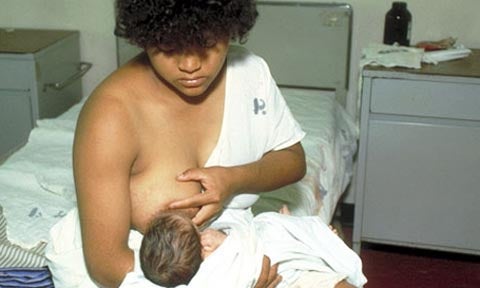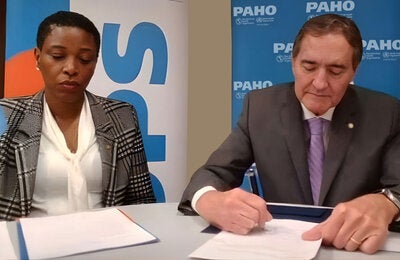Experts from the Pan American Health Organization (PAHO) renew calls for increased investments in breastfeeding promotion in Latin America and the Caribbean.
Washington, D.C., October 14, 2008 (PAHO)—The sickening of more than 50,000 Chinese babies due to contaminated infant formula provides a stark reminder of the importance of efforts to promote breastfeeding throughout the world, said public health experts at the Pan American Health Organization (PAHO).

While the crisis points to the need to prevent contaminated formula from reaching the market, it is difficult to entirely eliminate the risks of using formula, said PAHO Director Dr. Mirta Roses. Governments must also mitigate these risks by actively promoting breastfeeding as a better alternative to infant formula. "We as a Region can do more to protect the most vulnerable members of our society," said Dr. Roses.
"Telling women that 'breast is best' is not enough," said Dr. Socorro Gross, PAHO's Assistant Director. "Governments need to create and support the conditions that make breastfeeding possible in an increasingly globalized world."
Not enough
In addition to explaining that breast milk is better than formula, it is equally important to create "baby-friendly" environments, said Dr. Chessa Lutter, PAHO's Regional Advisor in Food and Nutrition. "This means, in hospitals, allowing mothers immediate and unrestricted access to their newborns and, in communities, providing skilled counseling to mothers. It also means creating and establishing breastfeeding-friendly workplaces."
Dr. Roses praised Brazil for setting an example by passing national legislation that establishes six months' maternity leave. "Brazil has been a leader in providing the conditions to make breastfeeding possible," she said.
With few exceptions, breast milk is the safest method of infant feeding, PAHO experts said. Breast milk has many short- and long-term benefits for both mothers and babies. Women who breastfeed lose weight more easily after childbirth and face less risk of breast and ovarian cancer. Studies show that children who are breastfed are smarter, have fewer respiratory and ear infections, and are less likely to get diabetes.
"Investing in promotion of breastfeeding is one of the 'best buys' for child survival and health," said Dr. Gross, adding that in Latin America and the Caribbean, these investments have brought significant increases in breastfeeding and child survival and health. "Unfortunately, over the past 10 years, there has been a steady decline in funds available for breastfeeding support, putting at-risk the gains that have been made."
Links
Press Release
Publications
- Beyond survival: Integrated delivery care practices for long-term maternal and infant nutrition, health and development (In Spanish)
PAHO, founded in 1902, works with all the countries of the Americas to improve the health and quality of life of their peoples. It also serves as the Regional Office for the Americas of the World Health Organization (WHO).
For more information please contact Daniel Epstein, Public Information, Knowledge Management and Communication, tel 202 974 3459,



